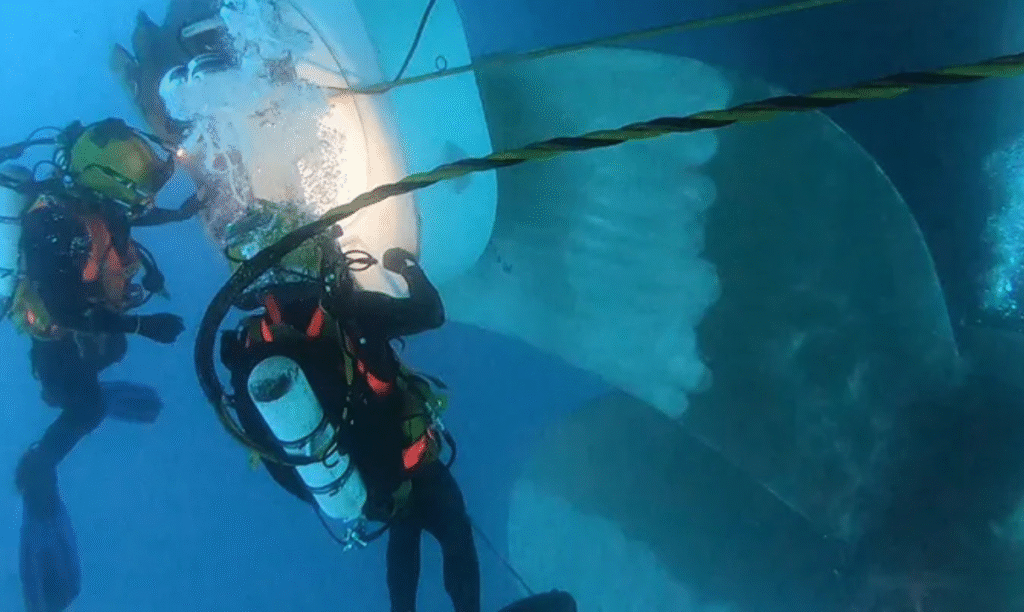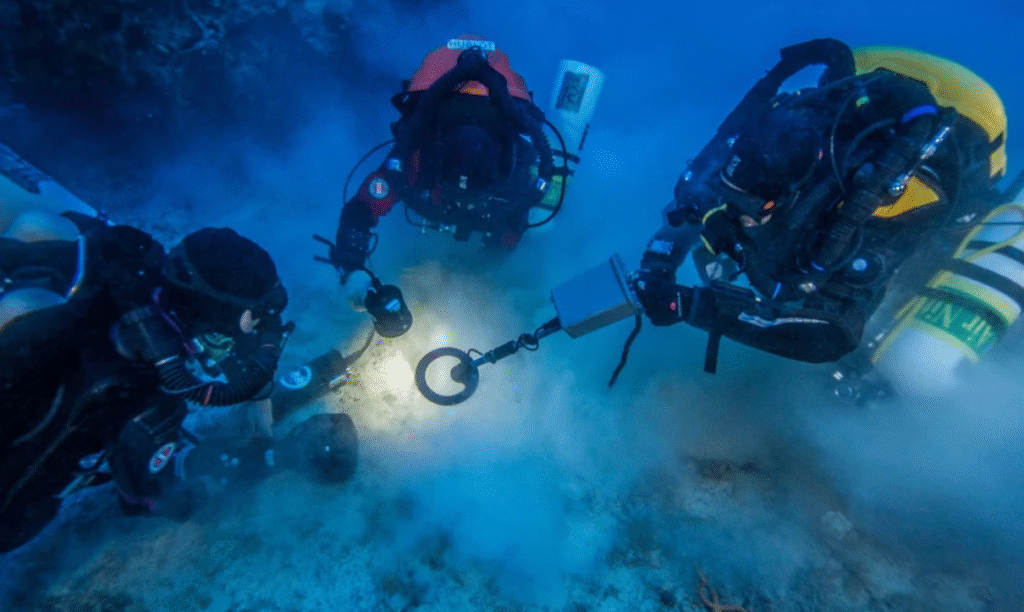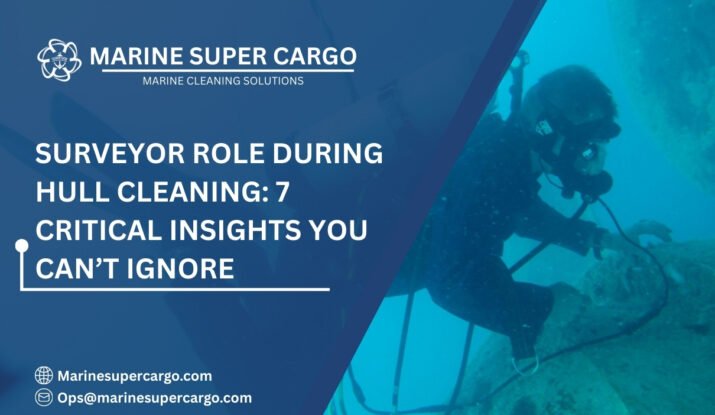When you think of underwater hull cleaning, the image that often comes to mind is divers, brushes, and advanced cleaning equipment. But behind the scenes, there is another crucial player safeguarding compliance, safety, and vessel efficiency: the surveyor.
The Surveyor Role During Hull Cleaning is far more than a formality—it is the backbone of assurance and accountability in ship maintenance. Without their keen oversight, shipowners and operators risk non-compliance, inefficiencies, and even severe environmental penalties.
In this article, we’ll dive into the essential responsibilities of surveyors, the risks of poor oversight, and why their presence can save shipowners time, money, and reputation. Let’s explore how surveyors act as the guardians of standards during hull cleaning operations.
Why Hull Cleaning Matters More Than Ever
The ship’s hull is like the skin of the vessel. Just as medical professionals check human skin for hidden problems, surveyors inspect the ship’s hull during maintenance. Over time, marine biofouling—such as barnacles, algae, and mussels—clings to hull surfaces. This increases friction, fuel consumption, and greenhouse gas emissions.
- A fouled hull can increase fuel consumption by up to 40%.
- Compliance with MARPOL Annex V and guidelines from the IMO means biofouling must be managed responsibly.
- Poorly managed hull cleaning can release invasive species or contaminants into local waters, leading to penalties.
Here’s where the Surveyor Role During Hull Cleaning becomes indispensable: they ensure both performance and compliance are upheld.
The Surveyor as Guardian of Compliance
Think of surveyors as referees in a championship game. The divers and crew play the match, but it’s the surveyor who ensures the rules are followed.
Key compliance areas they oversee:
- Environmental Standards: Surveyors ensure operations align with IMO and MARPOL requirements to prevent pollutant discharge.
- Safety Protocols: Compliance with IMCA diving standards ensures divers’ safety.
- Port Regulations: With ports getting stricter (IAPH guidelines), surveyors verify that operators follow local rules.
Without surveyor validation, a vessel may face detentions, fines, or reputational damage.

Core Responsibilities During Hull Cleaning
The Surveyor Role During Hull Cleaning covers multiple areas, from inspection to verification.
- Pre-Cleaning Assessment: Assess hull condition, fouling levels, and coatings integrity.
- Operational Oversight: Monitor divers’ safety, surface-supplied systems, and underwater procedures.
- Documentation: Compile inspection records, photos, and compliance reports.
- Post-Cleaning Verification: Ensure hull is cleaned effectively with no coating damage.
By balancing technical expertise with regulatory awareness, surveyors build trust between shipowners, operators, and regulators. Also read about underwater hull cleaning in Hsinking.
Benefits for Ship Operators
For shipowners and managers, involving a surveyor in hull cleaning operations translates into tangible benefits that directly impact efficiency, cost, and compliance. The Surveyor Role During Hull Cleaning ensures that every step of the process is conducted according to best practices, safeguarding both the vessel and the environment.
- Reduced Fuel Costs: Cleaner hulls cut drag, improving propulsion efficiency and saving thousands in annual fuel bills. Surveyors verify that cleaning is thorough, maximizing the benefits of antifouling coatings and minimizing energy loss.
- Stronger Compliance Track Record: By overseeing operations, surveyors help maintain adherence to regulations, reducing the risk of fines or detentions. The Surveyor Role During Hull Cleaning ensures documentation and inspection records are accurate and aligned with flag state requirements.
- Prolonged Coating Life: Surveyors monitor cleaning methods to prevent damage to antifouling coatings. Maintaining coating integrity extends the life of expensive paints and reduces the frequency of dry-docking repaint jobs.
- Peace of Mind: Having a qualified professional oversee cleaning provides unbiased operational assessments. The Surveyor Role During Hull Cleaning acts as a safeguard against procedural errors, ensuring both safety and efficiency.
In short, the Surveyor Role During Hull Cleaning is more than oversight — surveyors are custodians of operational efficiency, regulatory compliance, and sustainable maritime practices. Their presence ensures that hull maintenance is not just routine but optimized for long-term performance and cost-effectiveness.
Risks of Ignoring Surveyor Oversight
Skipping a surveyor’s involvement can be compared to skipping the seatbelt during a long drive—it might seem fine until a crisis strikes.
- Regulatory Penalties: Non-compliance with MARPOL guidelines can lead to fines and port bans.
- Hull Coating Damage: Over-aggressive cleaning may shorten coating lifespan.
- Safety Incidents: Lack of proper supervision increases diver risk.
- Inefficient Cleaning: Fouling may remain unnoticed, compromising efficiency.
The risks are not just theoretical; numerous port authorities now require documented surveys.
Surveyors and Environmental Protection
Beyond operational compliance, surveyors are gatekeepers of environmental stewardship. Their oversight helps curb the spread of invasive marine species—one of the IMO’s top environmental concerns. By ensuring cleaning waste is captured and disposed of safely, surveyors prevent coastal ecologies from being compromised.
Case Example: The Port Perspective
Imagine a vessel entering Singapore with biofouling attached. Without proper surveyor oversight during prior cleaning, the ship risks being delayed until re-cleaned. In contrast, a surveyor’s impartial inspection report offers quick clearance. The difference is measurable in thousands of dollars saved per day at port.
⚓ Expert Underwater Hull Cleaning with Marine Super Cargo 🌊
— Marine Super Cargo (@Marinsupercargo) September 19, 2025
A clean hull means better performance, lower fuel use, and smoother voyages. Marine Super Cargo offers top Underwater Hull Cleaning to keep your vessel efficient, compliant, and ready for every operation. pic.twitter.com/sVKAUCytuS
Future Trends in Surveyor Roles
Surveyors are evolving alongside maritime technology, taking on a more dynamic and tech-driven role in vessel maintenance. Their responsibilities now extend beyond traditional inspections, and the Surveyor Role During Hull Cleaning has become increasingly crucial in ensuring operational efficiency, safety, and environmental compliance.
New technologies are reshaping how surveyors operate:
- Remote-Operated Vehicles (ROVs): Surveyors can supervise hull cleaning and inspections via underwater drones, allowing them to monitor fouling removal in real time. This enhances accuracy while minimizing risks to personnel, highlighting the importance of the Surveyor Role During Hull Cleaning.
- Digital Reporting Platforms: Blockchain-backed compliance records provide transparency and traceability for every cleaning operation. Surveyors verify these digital logs, ensuring that each hull cleaning event meets international standards.
- AI-Powered Hull Analysis: Predictive tools enable surveyors to identify areas prone to fouling before it escalates, optimizing maintenance schedules and reducing fuel consumption. Here again, the Surveyor Role During Hull Cleaning is central to translating data insights into actionable maintenance plans.
- Sustainability Emphasis: As eco-friendly cleaning technologies gain traction, surveyors ensure that methods align with environmental guidelines, preventing invasive species spread and chemical pollution.
The Surveyor Role During Hull Cleaning is becoming more dynamic, blending human expertise with smart technologies. Also read about underwater hull cleaning in Colombia.

Practical Tips for Shipowners
If you’re managing a fleet, here’s how to maximize the benefits of proper surveyor oversight:
- Always engage an independent and accredited surveyor.
- Request thorough documentation after every cleaning operation.
- Ensure surveyors are familiar with IMO, IMCA, and IAPH guidelines.
- Incorporate surveyor reports into performance monitoring systems.
- Treat surveys as a long-term investment in efficiency, not a cost.
Conclusion
The Surveyor Role During Hull Cleaning is more than a compliance checkbox. It integrates safety, efficiency, and environmental protection into a unified process. By engaging surveyors, shipowners can protect hull performance, reduce operational costs, and safeguard against penalties.
Three Key Takeaways:
- Surveyors provide accountability in compliance, safety, and environmental protection.
- Their oversight translates into real savings through improved vessel performance.
- They are adapting with technology to meet stricter regulatory demands.
To secure these benefits, always partner with trusted experts who prioritize compliance and efficiency. For professional hull cleaning oversight and sustainable practices, visit CleanShip.co today.
FAQs:
Q1. Why is the surveyor’s role during hull cleaning so critical?
Surveyors ensure operations meet regulatory, safety, and environmental standards, preventing penalties and inefficiencies.
Q2. How does a surveyor reduce operational costs for shipowners?
By ensuring effective cleaning and preserving coatings, surveyors help cut fuel bills and avoid unnecessary repainting.
Q3. Which regulations must surveyors consider during hull cleaning?
They align with MARPOL, IMO, IMCA, and IAPH marine guidelines to ensure global compliance.
Q4. Can hull cleaning be approved without a surveyor present?
Some ports allow it, but without surveyor oversight, ships risk delays, fines, or costly re-cleaning.
Q5. What future innovations affect the surveyor’s role in hull cleaning?
ROVs, AI-driven inspections, and eco-focused cleaning systems are expanding surveyor capabilities.


